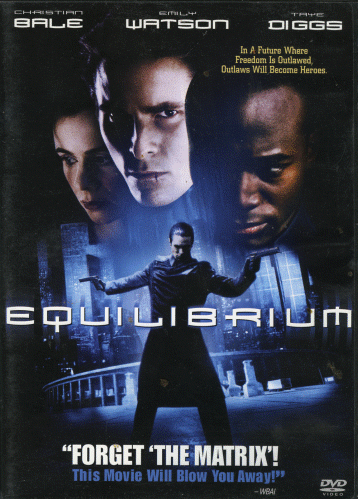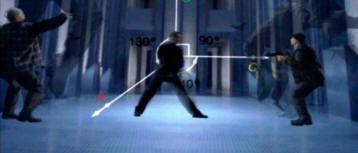|
"It
was decided that ... whoever was the head of Opus Dei, would
be called "the Father."
-- Matt's Opus Dei FAQ, by Matthew G. Collins
pro·sa·ic
Pronunciation [proh-zey-ik]
–adjective 1. commonplace or dull; matter-of-fact or
unimaginative: a prosaic mind.
2. of or having the character or form of prose rather than
poetry.
***
pro·zac
Pronunciation [pro-zak]
–noun 1. Registered trademark of Eli Lilly for marketing
fluoxetine hydrochloride as an antidepressant since January 28,
1985, registration renewed July 14, 2006. The linguistic
structure of this word is entirely the product of a sustained
effort to create a word that would bond with the public mind,
communicating its intended meaning on subliminal levels in
perpetuity. Like many brain drugs, Prozac is a
two-syllable construction, the first half, "pro," an
abbreviation of "professional," which has an upper-class ring to
it, and also suggests a positive spin, as in "making progress,"
which all depressed people long to do. When we inhabit
this word, we dwell in the "Pro" half. The next half of
the word is active, coming down like an
ax -- "zak." The "z,"
being the last letter of the alphabet, symbolizes ending, the
last, beyond that which is either nothing or "a." And the
next letter is in fact, "a."
The final letter is "k,"
the eleventh letter of the
alphabet. So we have end, beginning, and the double. The
net effect is to make the speaker of the word feel like they are wearing a suit of armor, living
like a Pro, while Eli Lilly zaks all the negativity into
normalcy.
***
pro·zi·um
Pronunciation [proh-zee-um]
–noun 1. In the future nation of Libria depicted in the film
"Equilibrium," all citizens are required to "take Prozium," a
drug that has ended war and violence, at the cost of persecuting
those who won't take their Prozium. The first half of the
word is "Pro," of latinate origin, which is used in Father's
speeches to emphasize every good Librian's duty to take the
battle to the source of all human problems -- feelings -- and
eradicate them before they spawn their noxious fruit of sense
offense. The second and third syllable, pronounced
together, hold the means to eradicate feelings. "Z," the
last letter in the alphabet, symbolizes ending, which explicitly
becomes death, lethality, in the form of the "zium" ending, when
joined to the "ium" suffix. "Ium" ends the names of all
nuclear isotopes, such as radium, uranium, plutonium, polonium,
etc., and all such isotopes are lethal. Prozium does not
destroy the body, however. Prozium destroys the mind.
Prozium is an atomic bomb that goes off inside the mind, flattening the complex and
enticing city of feelings, reducing it to a manageable
wasteland of sensationless existence.
"Of the many excellences which
I perceive in the order of our State, there is none which upon
reflection pleases me better than the rule about poetry.
To what do you refer?
To the rejection of imitative
poetry, which certainly ought not to be received; as I see far
more clearly now that the parts of the soul have been
distinguished.
What do you mean?
Speaking in confidence, for I
should not like to have my words repeated to the tragedians and
the rest of the imitative tribe — but I do not mind saying to
you, that all poetical imitations are ruinous to the
understanding of the hearers, and that the knowledge of their
true nature is the only antidote to them.
Explain the purport of your
remark.
Well, I will tell you, although
I have always from my earliest youth had an awe and love of
Homer, which even now makes the words falter on my lips, for he
is the great captain and teacher of the whole of that charming
tragic company; but a man is not to be reverenced more than the
truth, and therefore I will speak out.
We may state the question thus:
— Imitation imitates the actions of men, whether voluntary or
involuntary, on which, as they imagine, a good or bad result has
ensued, and they rejoice or sorrow accordingly. Is there
anything more?
No, there is nothing else.
But we have not yet brought
forward the heaviest count in our accusation: — the power which
poetry has of harming even the good (and there are very few who
are not harmed), is surely an awful thing?
Yes, certainly, if the effect
is what you say.
Hear and judge: The best of us,
as I conceive, when we listen to a passage of Homer, or one of
the tragedians, in which he represents some pitiful hero who is
drawling out his sorrows in a long oration, or weeping, and
smiting his breast — the best of us, you know, delight in giving
way to sympathy, and are in raptures at the excellence of the
poet who stirs our feelings most.
Yes, of course I know.
But when any sorrow of our own
happens to us, then you may observe that we pride ourselves on
the opposite quality — we would fain be quiet and patient; this
is the manly part, and the other which delighted us in the
recitation is now deemed to be the part of a woman.
Very true, he said.
Now can we be right in praising
and admiring another who is doing that which any one of us would
abominate and be ashamed of in his own person?
No, he said, that is certainly
not reasonable.
And the same may be said of
lust and anger and all the other affections, of desire and pain
and pleasure, which are held to be inseparable from every action
— in all of them poetry feeds and waters the passions instead of
drying them up; she lets them rule, although they ought to be
controlled, if mankind are ever to increase in happiness and
virtue.
I cannot deny it.
Therefore, Glaucon, I said,
whenever you meet with any of the eulogists of Homer declaring
that he has been the educator of Hellas, and that he is
profitable for education and for the ordering of human things,
and that you should take him up again and again and get to know
him and regulate your whole life according to him, we may love
and honour those who say these things — they are excellent
people, as far as their lights extend; and we are ready to
acknowledge that Homer is the greatest of poets and first of
tragedy writers; but we must remain firm in our conviction that
hymns to the gods and praises of famous men are the only poetry
which ought to be admitted into our State. For if you go beyond
this and allow the honeyed muse to enter, either in epic or
lyric verse, not law and the reason of mankind, which by common
consent have ever been deemed best, but pleasure and pain will
be the rulers in our State.
That is
most true, he said."
-- The Republic, Book X, by
Plato
"'The Sea of Faith
Was once, too, at the full, and round earth's shore
Lay like the folds of a bright girdle furled.
But now I only hear
Its melancholy, long, withdrawing roar,
Retreating, to the breath
Of the night-wind, down the vast edges drear
And naked shingles of the world.
Ah, love, let us be true
To one another! for the world, which seems
To lie before us like a land of dreams,
So various, so beautiful, so new,
Hath really neither joy, nor love, nor light,
Nor certitude, nor peace, nor help for pain;
And we are here as on a darkling plain
Swept with confused alarms of struggle and flight,
Where ignorant armies clash by night.'
Mrs. Bowles stood up and glared at Montag. 'You see? I knew it,
that's what I wanted to prove! I knew it would happen! I've
always said poetry and tears, poetry and suicide and crying and
awful feelings, poetry and sickness; all that mush! Now I've had
it proved to me. You're nasty, Mr. Montag, you're nasty! Silly
words, silly words, silly awful hurting words. Why do
people want to hurt people? Not enough hurt in the world, you
got to tease people with stuff like that."
-- "Fahrenheit 451," by Ray Bradbury |

